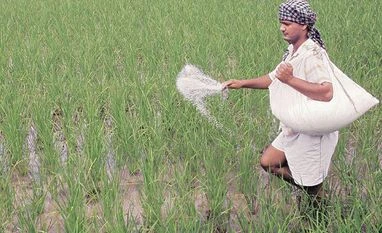Direct transfer of the fertiliser subsidy to farmers is leading to some fudging of procedures by retailers, shows a study.
The Centre has expanded Direct Benefits Transfer (DBT) in fertiliser across the country from April 1.
A study done by a leading international consultancy on the request of NITI Aayog and the department of fertiliser showed a rise in retailers using their own or someone else’s Aadhaar number instead of the farmer’s to register sales during the peak season. Peak purchase of fertiliser for the kharif season starts from July and lasts till September.
The survey done by ‘MicroSave’ shows the incidence of such adjusted transactions rose from 10 per cent to 21 per cent between their second and third round of surveys. The first round was in September 2016, the second in January 2017 and the third during July to September 2017.
The surveys were done with the aim of providing the government with actionable solutions to improve implementation and preparedness for national rollout of DBT. MicroSave conducted the research with 427 retailers and 5,659 farmers for the third phase.
Such ‘adjusted transactions’ were also in the form of retailers registering all sales for the day while using a few Aadhaar numbers.
Farmers are required to authenticate through their Aadhaar numbers every time a bag of fertiliser is purchased, which initiates the process of subsidy transfer to the company.
Experts said not authenticating the actual sales through Aadhaar at the time of sales might not cause a big difference now but it goes against the concept of accurate authentication. It might cause problems when the subsidy amount starts getting transferred into the bank account of farmers.
“In one district of Thrissur (Kerala), almost all the fertiliser was being sold manually, though retailers had Point of Sale (PoS) devices and the Aadhaar authentication was being done later,” Mitul Thapliyal, associate director at MicroSave, told Business Standard.
He said if one removed Thrissur from the list, the total number of adjusted transactions fell to 15 per cent from 21 per cent, which also shows a rise during the peak sale season.
He said one reason why retailers where adjusting transactions during the peak season was that the PoS machines could handle 100-120 transactions in a single day, while the peak season had 200-250 farmers visiting a fertiliser retailer.
“The transaction time for completing the process of Aadhaar authentication was five minutes across all the surveys, which shows there hasn’t been any improvement in it,” Thapliyal said.
That apart, the survey shows the transaction experience for farmers had improved. Successful Aadhaar authentication in the first attempt had increased to 62 per cent, as compared to 35 per cent in the second round.
Also, that 55 per cent of retailers and 59 per cent of farmers preferred DBT over the manual system of fertiliser distribution.
“We now plan to expand the survey to cover more districts and larger numbers of farmers from June,” Thapliyal said.
MicroSave’s survey comes months after an analysis on e-NaM showed traders were manually feeding farmer details on the electronic platform.
a) 54% — retailers preferred DBT over cash-based transactions
b) 59% — farmers preferred DBT over cash-based transactions
c) 30% — farmers were Soil Health Cards (SHCs)
d) 98% — farmers charged the same amount as shown in DBT receipt
e) 21% — retailers adjusted Aadhar authentication during peak sale season
f) 5 mins — average transaction time through PoS
Source: MicroSave Survey
Unlock 30+ premium stories daily hand-picked by our editors, across devices on browser and app.
Pick your 5 favourite companies, get a daily email with all news updates on them.
Full access to our intuitive epaper - clip, save, share articles from any device; newspaper archives from 2006.
Preferential invites to Business Standard events.
Curated newsletters on markets, personal finance, policy & politics, start-ups, technology, and more.
)